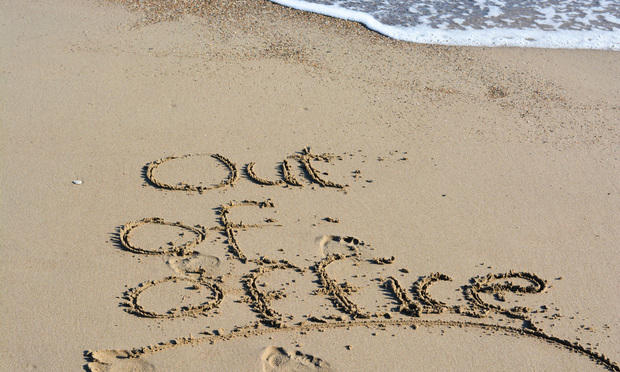For Stressed-Out Lawyers, Sabbaticals Offer a Chance to Breathe
Law firms and their employees alike say they benefit when lawyers are offered a break from work.
June 24, 2019 at 03:35 PM
7 minute read

Shook, Hardy & Bacon trial lawyer Peter Henk celebrated the first day of a three-month sabbatical with the delivery of a motorcycle.
"It's a sport bike, a starter bike. I'm not doing anything crazy to begin with. I'm just going to learn," says Henk, a partner in Houston who does products liability litigation and started his sabbatical in early May.
Shook Hardy is one of a small number of firms that provide lawyers, and in some cases staff, the opportunity to take a sabbatical so they can recharge and return ready to tackle the stresses of working as a lawyer. At a time when mental health is front and center in the legal profession, sabbaticals are one way firms help their partners and employees cope with the burdens of the job.
"To be resilient, it makes perfect sense to allow attorneys to take sabbaticals, and would probably make sense in regard to profitability. You would be able to have more production from that person, and quite frankly avoid terminal burnout where you lose very valued, skilled lawyers," says Chris Ritter, director of the Texas Lawyers Assistance Program at the State Bar of Texas.
Jennise Stubbs, managing partner of Shook Hardy's Houston office, says the profession needs to recognize how job pressures lead to suicide and substance abuse.
"I really think this [sabbaticals] would help with the ailings that are going on in our profession. It seems kind of like a no-brainer to me," says Stubbs, who took her first sabbatical last summer.
While sabbaticals can relieve individuals' stress, they also benefit firms by fostering teamwork, ease client succession planning, and aid in recruiting and retention.
Walter Cofer, a Shook Hardy partner in Kansas City, Missouri, who has taken four sabbaticals, including one last fall, says he talks with his clients well in advance of his leave so they know that other lawyers are available.
"You get out of the way to give younger lawyers the opportunity for client contact," he says, "and to stretch."
 Shook, Hardy & Bacon's Walt Cofer, right, on a sabbatical with his wife, Nicola, in the Douro Valley in Portugal.
Shook, Hardy & Bacon's Walt Cofer, right, on a sabbatical with his wife, Nicola, in the Douro Valley in Portugal.Shook Hardy instituted a policy of mandatory sabbaticals for partners back in 1986, at the behest of former chairman Bill Shinn, according to current chairwoman Madeleine McDonough, The firm strongly encourages all partners to take sabbaticals, which are available after a partner completes seven years at the firm, and then every sixth year.
"It's just a huge benefit. It's a wonderful recruiting tool, retention tool, and also prevents burnout," McDonough says, adding that a partner's compensation is not affected by the sabbatical, but they do have to promise to return to Shook Hardy for at least a year.
During two sabbaticals, McDonough traveled internationally and spent time with family and friends. But partners spend the time in many ways.
"People have written books, they taught classes, went back to school for a summer program," McDonough says. "Most people tend to spend more time with their family. We have people who have taken their kids to every baseball park in the country. We've had people climb mountains."
Stubbs says she came back to work relaxed after her sabbatical and with a clear mind, and she knew her partners would cover her work. She traveled with her husband and spent time at home with her three sons.
"I'm very happy to be a working mom and have a great job and a happy life, but it's nice to just slow down," Stubbs says.
Rebecca Hudson, a partner at Holland & Hart in Denver, says her firm's sabbatical program dates back to the early 1970s, when the firm recognized that lawyers, as owners of the business, have additional levels of stress not alleviated by short vacations.
The biggest goal for a sabbatical is to provide a "period away from the office to really step away from your office for three months and get that rejuvenation and ability to check out," Hudson says. "You come back from your sabbatical with your sleeves rolled up and ready to return to your practice."
The firm's policy calls for a three-month sabbatical for partners every five years. Hudson says it works smoothly because at least two lawyers are on each client engagement, so there are multiple touch points for each client.
Hudson's advice to partners taking a sabbatical is to plan an immediate trip out of town. She spent time at home with her family during her two sabbaticals, traveled to Europe, trained for marathons, and spent time in Nantucket. Her family also welcomed a puppy during her last sabbatical, in 2015.
Holland & Hart clearly benefits in recruiting and retention, Hudson says. The firm in 2016 adopted a minisabbatical program for nonpartner lawyers and professionals that provides six weeks off every seven years after spending 12 years at the firm.
Hudson says lawyer stress levels are higher than in the past and are hard to address on a regular vacation.
"It is truly incumbent on the partners and firm management to make sure we preserve the health of our people, and the sabbatical is one of those things that helps," she says.
Perkins Coie has offered sabbaticals to partners, senior lawyers and staff for many decades, managing partner John Devaney says. In addition to benefiting lawyers and staff, Devaney says it gives those who are covering for colleagues on leave time to develop new relationships and skill sets.
Devaney took a sabbatical in 1999, when his kids were young. "It allowed for five weeks of unforgettable travel," he says. He plans to take a two-month sabbatical when he steps down at the end of June after five years as managing partner.
"We are going to the beach in South Carolina. I'm going to catch up on all of those books I haven't read," he says.
Julia Markley, a litigation partner at Perkins Coie in Portland, Oregon, says a sabbatical has been in the back of her mind since she heard about it as a summer associate. She took three months beginning last November, and came back rejuvenated.
"I decided to travel for six weeks and I was a stay-at-home mom for six weeks of my sabbatical. I got to walk them to school every day and sit in a coffee shop and read three newspapers a day, and do decluttering and home projects, and cook dinner from scratch," she says.
Henk, the Shook Hardy partner, who represents Phillip Morris USA and will start a trial after he returns to work later this summer, says he plans to do more than learn to ride a motorcycle on his leave.
With family, he will travel to Greece, but his other big goal is running an 800-meter race at the National Senior Games in June in Albuquerque, New Mexico. Being on sabbatical gives him time to train. He says sabbaticals work well because Shook Hardy values teamwork, and lawyers don't worry they are shortchanging clients.
"We depend upon each other, and everyone's happy, genuinely happy, for the person who is about to take their sabbatical. It's not, 'Oh my gosh, I wish it would be me,'" he says, "because they know their time is coming."
Email: [email protected]
This content has been archived. It is available through our partners, LexisNexis® and Bloomberg Law.
To view this content, please continue to their sites.
Not a Lexis Subscriber?
Subscribe Now
Not a Bloomberg Law Subscriber?
Subscribe Now
NOT FOR REPRINT
© 2025 ALM Global, LLC, All Rights Reserved. Request academic re-use from www.copyright.com. All other uses, submit a request to [email protected]. For more information visit Asset & Logo Licensing.
You Might Like
View All
Government Attorneys Face Reassignment, Rescinded Job Offers in First Days of Trump Administration
4 minute read


Energy Lawyers Field Client Questions as Trump Issues Executive Orders on Industry Funding, Oversight
6 minute readTrending Stories
- 1No Two Wildfires Alike: Lawyers Take Different Legal Strategies in California
- 2Poop-Themed Dog Toy OK as Parody, but Still Tarnished Jack Daniel’s Brand, Court Says
- 3Meet the New President of NY's Association of Trial Court Jurists
- 4Lawyers' Phones Are Ringing: What Should Employers Do If ICE Raids Their Business?
- 5Freshfields Hires Ex-SEC Corporate Finance Director in Silicon Valley
Who Got The Work
J. Brugh Lower of Gibbons has entered an appearance for industrial equipment supplier Devco Corporation in a pending trademark infringement lawsuit. The suit, accusing the defendant of selling knock-off Graco products, was filed Dec. 18 in New Jersey District Court by Rivkin Radler on behalf of Graco Inc. and Graco Minnesota. The case, assigned to U.S. District Judge Zahid N. Quraishi, is 3:24-cv-11294, Graco Inc. et al v. Devco Corporation.
Who Got The Work
Rebecca Maller-Stein and Kent A. Yalowitz of Arnold & Porter Kaye Scholer have entered their appearances for Hanaco Venture Capital and its executives, Lior Prosor and David Frankel, in a pending securities lawsuit. The action, filed on Dec. 24 in New York Southern District Court by Zell, Aron & Co. on behalf of Goldeneye Advisors, accuses the defendants of negligently and fraudulently managing the plaintiff's $1 million investment. The case, assigned to U.S. District Judge Vernon S. Broderick, is 1:24-cv-09918, Goldeneye Advisors, LLC v. Hanaco Venture Capital, Ltd. et al.
Who Got The Work
Attorneys from A&O Shearman has stepped in as defense counsel for Toronto-Dominion Bank and other defendants in a pending securities class action. The suit, filed Dec. 11 in New York Southern District Court by Bleichmar Fonti & Auld, accuses the defendants of concealing the bank's 'pervasive' deficiencies in regards to its compliance with the Bank Secrecy Act and the quality of its anti-money laundering controls. The case, assigned to U.S. District Judge Arun Subramanian, is 1:24-cv-09445, Gonzalez v. The Toronto-Dominion Bank et al.
Who Got The Work
Crown Castle International, a Pennsylvania company providing shared communications infrastructure, has turned to Luke D. Wolf of Gordon Rees Scully Mansukhani to fend off a pending breach-of-contract lawsuit. The court action, filed Nov. 25 in Michigan Eastern District Court by Hooper Hathaway PC on behalf of The Town Residences LLC, accuses Crown Castle of failing to transfer approximately $30,000 in utility payments from T-Mobile in breach of a roof-top lease and assignment agreement. The case, assigned to U.S. District Judge Susan K. Declercq, is 2:24-cv-13131, The Town Residences LLC v. T-Mobile US, Inc. et al.
Who Got The Work
Wilfred P. Coronato and Daniel M. Schwartz of McCarter & English have stepped in as defense counsel to Electrolux Home Products Inc. in a pending product liability lawsuit. The court action, filed Nov. 26 in New York Eastern District Court by Poulos Lopiccolo PC and Nagel Rice LLP on behalf of David Stern, alleges that the defendant's refrigerators’ drawers and shelving repeatedly break and fall apart within months after purchase. The case, assigned to U.S. District Judge Joan M. Azrack, is 2:24-cv-08204, Stern v. Electrolux Home Products, Inc.
Featured Firms
Law Offices of Gary Martin Hays & Associates, P.C.
(470) 294-1674
Law Offices of Mark E. Salomone
(857) 444-6468
Smith & Hassler
(713) 739-1250










